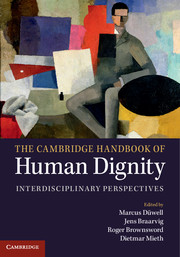Book contents
- Frontmatter
- Contents
- List of contributors
- Foreword
- Why a handbook on human dignity?
- Acknowledgments
- 1 Human dignity from a legal perspective
- 2 Human dignity: concepts, discussions, philosophical perspectives
- Part I Origins of the concept in European history
- Part II Beyond the scope of the European tradition
- Part III Systematic conceptualization
- 19 Social and cultural presuppositions for the use of the concept of human dignity
- 20 Is human dignity the ground of human rights?
- 21 Human dignity: can a historical foundation alone suffice? From Joas’ affirmative genealogy to Kierkegaard's leap of faith
- 22 Kantian perspectives on the rational basis of human dignity
- 23 Kantian dignity: a critique
- 24 Human dignity and human rights in Alan Gewirth's moral philosophy
- 25 Human dignity in the capability approach
- 26 Human dignity in Catholic thought
- 27 Jacques Maritain's personalist conception of human dignity
- 28 Scheler and human dignity
- 29 Dignity and the Other: dignity and the phenomenological tradition
- 30 Dignity, fragility, singularity in Paul Ricœur's ethics
- 31 Human dignity as universal nobility
- 32 Dignity in the ubuntu tradition
- 33 Posthuman dignity
- 34 Dignity as the right to have rights: human dignity in Hannah Arendt
- 35 Individual and collective dignity
- Part IV Legal implementation
- Part V Conflicts and violence
- Part VI Contexts of justice
- Part VII Biology and bioethics
- Appendix 1 Further reading
- Appendix 2 Universal Declaration of Human Rights
- Index
- References
25 - Human dignity in the capability approach
from Part III - Systematic conceptualization
Published online by Cambridge University Press: 05 March 2015
- Frontmatter
- Contents
- List of contributors
- Foreword
- Why a handbook on human dignity?
- Acknowledgments
- 1 Human dignity from a legal perspective
- 2 Human dignity: concepts, discussions, philosophical perspectives
- Part I Origins of the concept in European history
- Part II Beyond the scope of the European tradition
- Part III Systematic conceptualization
- 19 Social and cultural presuppositions for the use of the concept of human dignity
- 20 Is human dignity the ground of human rights?
- 21 Human dignity: can a historical foundation alone suffice? From Joas’ affirmative genealogy to Kierkegaard's leap of faith
- 22 Kantian perspectives on the rational basis of human dignity
- 23 Kantian dignity: a critique
- 24 Human dignity and human rights in Alan Gewirth's moral philosophy
- 25 Human dignity in the capability approach
- 26 Human dignity in Catholic thought
- 27 Jacques Maritain's personalist conception of human dignity
- 28 Scheler and human dignity
- 29 Dignity and the Other: dignity and the phenomenological tradition
- 30 Dignity, fragility, singularity in Paul Ricœur's ethics
- 31 Human dignity as universal nobility
- 32 Dignity in the ubuntu tradition
- 33 Posthuman dignity
- 34 Dignity as the right to have rights: human dignity in Hannah Arendt
- 35 Individual and collective dignity
- Part IV Legal implementation
- Part V Conflicts and violence
- Part VI Contexts of justice
- Part VII Biology and bioethics
- Appendix 1 Further reading
- Appendix 2 Universal Declaration of Human Rights
- Index
- References
Summary
The capability approach is a broad normative approach which has been developed from the 1980s onwards, most prominently by economist Amartya Sen and philosopher Martha Nussbaum. In the philosophical context, the main use of the approach is to assess the justice of social arrangements: societies are just to the extent that they guarantee each citizen an entitlement to his or her basic capabilities. In more recent years, Nussbaum has emphasized the fact that the capability approach is a human rights approach, and has begun to ground her version of the approach in a specific concept of human dignity. In this chapter, I will first briefly summarize the main concepts used in the capability approach, and then present Nussbaum's concept of dignity as a grounding of that approach. Finally, I will criticize this way of using the concept of dignity and raise some questions.
The capability approach
The capability approach is used by social scientists, lawyers and philosophers, in a variety of contexts, for descriptive, evaluative and prescriptive purposes. What all these uses share is only a rather minimal conceptual apparatus: namely, a stress on ‘capabilities to functionings’ as the favoured focus for research.
- Type
- Chapter
- Information
- The Cambridge Handbook of Human DignityInterdisciplinary Perspectives, pp. 240 - 249Publisher: Cambridge University PressPrint publication year: 2014
References
- 17
- Cited by



